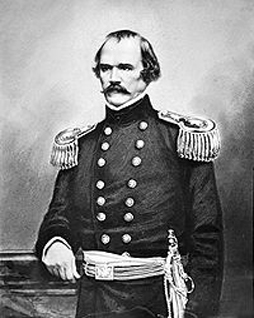|
Kentucky’s Civil War leaders…
Johnston was considered finest
general officer in Confederacy
(EDITOR’S NOTE: This is the 15th in a series about Kentucky’s officers and battle leaders during the Civil War.)
Albert Sidney Johnston was a career U.S. Army officer, a Texas Army general and a Confederate States general.
The native of Mason County, Ky., lived most of his life in Texas, which he considered home. He was considered by Confederate President Jefferson Davis to be the finest general officer in the Confederacy prior to the emergence of Robert E. Lee. Johnston died at the Battle of Shiloh at the age of 59 and was the highest-ranking officer – Union or Confederate – to be killed during the entire war.
Johnston enrolled at Transylvania University in the 1820s, and, while there, he befriended Davis, the future president of the Confederacy. Like his friend, Johnston soon transferred from Transylvania to the U.S. Military Academy at West Point. He graduated in 1826, ranking eighth in a class of 41. Accepting a commission as a brevet second lieutenant, Johnston was posted to the 2nd U.S. Infantry. During his military career, Johnston saw extensive combat in the Texas War of Independence and the Mexican and Utah Wars.
In 1829, he married Henrietta Preston, sister of Kentucky politician and future Civil War general William Preston. He resigned his commission in 1834 to return to Kentucky to care for his dying wife, who succumbed two years later to tuberculosis. They had one son, Col. William Preston Johnston, who also would serve in the Confederate Army.
With the outbreak of the Civil War, Johnston was warmly received by his friend Davis and was appointed a full general in the Confederate Army on May 31, 1861. The second-most senior officer in the army, he was placed in command of the Western Department with orders to defend between the Appalachian Mountains and the Mississippi River. Johnston seized Bowling Green in 1861 and made it his headquarters. By late that year, Bowling Green became the heart of the Confederacy’s efforts in Kentucky.
However, following the loss of Forts Henry and Donelson and the Union capture of Nashville, Johnston began concentrating his forces at Corinth, Miss., with the goal of striking at Ulysses S. Grant's army at Pittsburg Landing, Tenn. Attacking on April 6, 1862, Johnston opened the Battle of Shiloh by catching Grant's army by surprise and quickly overrunning its camps. Leading from the front, Johnston seemingly was everywhere on the field directing his men. During one charge, he was wounded behind the right knee, most likely from friendly fire.
Not thinking the injury serious he released his personal surgeon to aid several wounded soldiers. A short time later, Johnston realized that his boot was filling with blood as the bullet had nicked an artery. Feeling faint, he was taken from his horse and placed in a small ravine where he bled to death a short time later. The general first was buried in New Orleans and, in 1867, his body was moved to the Texas State Cemetery in Austin.
|









